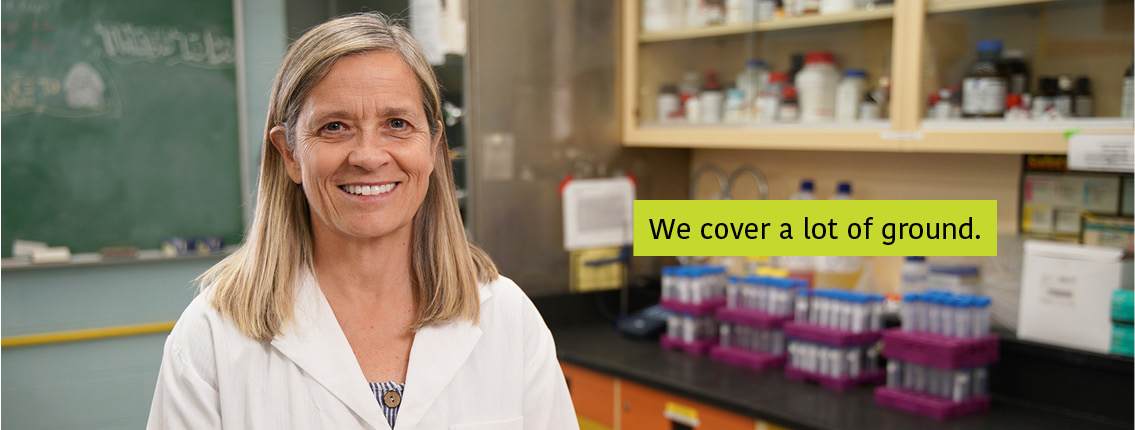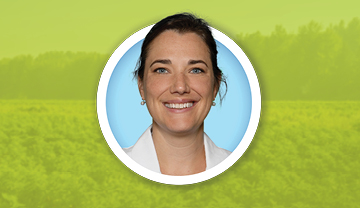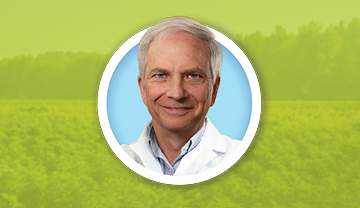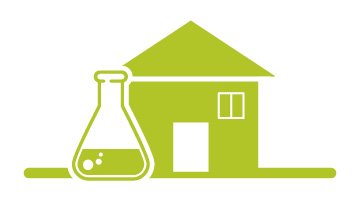
Dr. Karen Beauchemin
Research Scientist – Digestion and Metabolism Specialist (Retired)
Lethbridge Research and Development Centre
Why did you become a scientist?
I worked as a beef and dairy cattle nutritionist for several years after completing my Masters degree in animal science. That was a great experience, but I quickly realized that I wanted to dig deeper into the "why" and "how" of animal nutrition. I pursued my education and completed my doctorate in ruminant nutrition, and was very fortunate to be offered a scientist position with Agriculture and Agri-Food Canada.
Meet Dr. Karen Beauchemin
Video transcript
[Rhythmic technological music starts.]
[A tractor and potato harvester wait in a field, rows of potatoes on the left, onions on the right. The harvester moves slowly, picks up the potatoes and loads them into a truck. Freshly harvested iceberg lettuce is cored and placed on a moving ramp where it’s sprayed with water.]
In Canada, agriculture as a whole contributes 8% of the national greenhouse gas budget. Methane emissions from cattle contribute 40% of agricultural emissions, so 3.5% of all the emissions are from cattle.
[A sprawling farm is seen from overhead, and cattle graze in a field.]
[Dr. Karen Beauchmin, wearing a lab coat, walks down a hall in a research centre. She opens the door to the Ruminant Nutrition laboratory and enters.]
Text on screen: Lethbridge, Alberta
My name is Karen Beauchemin and I am a ruminant nutritionist at the Lethbridge research centre.
[Karen in the lab. Text appears beneath her.]
Text on screen: Dr. Karen Beauchemin, Research scientist – Ruminant Nutrition, Agriculture and Agri-Food Canada
Cows have a unique digestive system that allows them to digest fibre, but as a normal bi-product of that fermentation process they produce methane.
[Cows feeding in a barn. Cattle and ranchers on horseback move through a hilly pasture.]
And that methane produced in the rumen or in the stomach is released via the breathe into the atmosphere, and methane is a potent greenhouse gas.
[Karen in her lab, with fellow scientists. They place small bottles into a cabinet where they are mechanically stirred.]
So, in our research we're interested in developing ways to feed cattle so we have highly productive animals, healthy animals, that produce less methane. We have been looking at a particular feed additive that when fed to the cattle reduce methane emissions by about 30%. That is both for beef cattle and for dairy cattle.
[Scientists fill small sample bottles, work at computers and various scientific work stations.]
So that's very promising for the industry. There's a lot of value especially in a country like Canada, where we have tremendous amounts of permanent pasture and grasslands. There's a lot of advantages of maintaining cattle on those grasslands.
[Cattle and ranchers on horseback move through a hilly pasture.]
So we need to find ways of keeping our beef cattle on those grasslands, but reducing methane emissions.
Text on screen: Learn more at agr.gc.ca/fields-of-science. We cover a lot of ground.
[The Canada wordmark appears. The technological music fades out.]
Profile
What would you consider your biggest breakthrough?
My biggest breakthrough was developing a research program in the early 2000s to measure methane emissions from cattle with the goal of finding ways to curb those emissions. Methane is a greenhouse gas and an energy loss for the animal. Because of our foresight back then, we have been able to contribute science-based information to the dialogue surrounding sustainable meat and milk production in Canada.
What do you like most about your work?
I like the creative part of being a scientist and the ability to "dig deep" into particular issues. I enjoy reviewing a certain topic and developing a new idea then testing the concept in a series of research studies. That often means working with other national and international experts to find the best way forward. I enjoy analyzing the data, interpreting the results, and writing the scientific manuscript that is reviewed by international experts. It is satisfying when the results lead to practical outcomes for livestock producers or new information for consumers.
What do you find most challenging about your work?
The process is very slow with a lot of repetition, so tremendous patience is needed. Before the research can be conducted, it is necessary to obtain funding, which means convincing people that the research is important. That can be difficult because an idea can be years ahead of current practice, making it difficult to show the immediate relevance.
What would Canadians be surprised to learn about your research?
In my research, I've learned that cattle have a unique ability to digest fiber, but during that process they produce methane, a potent greenhouse gas. Methane from beef and dairy cattle in Canada makes up about 4% of our national greenhouse gas budget. We are looking at improving cattle nutrition so that they produce less methane gas while ensuring good health and production. For example, by feeding a new methane-inhibiting supplement to cattle, we have shown that it is possible to reduce methane production by 30%.
Although cattle produce methane gas, they also graze lands which is important for Prairie ecosystems. For example, cattle grazing helps to keep carbon in the soil, improve soil health, control erosion, reduce invasive species, improve water quality, maintain biodiversity, and provide habitat for wildlife.
So the story of environment and cattle is complex. And it's that complexity that intrigues me. It is also why I am working hard to lessen the environmental impacts as much as possible.
Improved cattle nutrition - a breath away from a better environment
Climate change is on everyone's mind as we all look for ways to reduce our environmental footprint. In agriculture, that means thinking about new ways to produced food sustainably.
Agriculture and Agri Food Canada (AAFC) researchers have helped improve the quality, yield, safety and sustainability of the food produced by Canadian farmers. Dr. Karen Beauchemin at AAFC's Lethbridge Research and Development Centre in Alberta thinks she and her team can make progress in reducing methane, a greenhouse gas.
"The success we've seen in the lab and the field shows that, through diet and genetics, methane emissions from cattle can be further reduced by 50%", she says.
Livestock account for about 15% of greenhouse gas emissions worldwide. Canadian farmers have steadily cut those emissions down, thanks to research making livestock production more efficient and environmentally friendly.
Dr. Beauchemin and her team are taking sustainability a step further by zeroing in on the methane that cows naturally exhale as they digest grass. Her team is trying different approaches to reduce these emissions.
For example, they have developed and evaluated feed additives for cattle that help with digestion. Zeroing in on cattle nutrition, they've fine-tuned cattle diets to provide exactly what the animals need, and nothing more.
Then there's genetics. Some animals are simply better at digesting food than others, and they gain weight faster or produce more milk, while emitting much less methane over the course of their lives.
Dr. Beauchemin and her colleagues are encouraged by the results of the multiple projects and trials. Like many important and complex challenges, it's often a combination of many small improvements that add up to big results.


